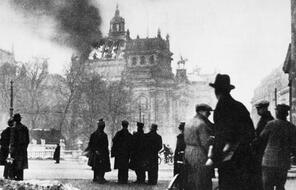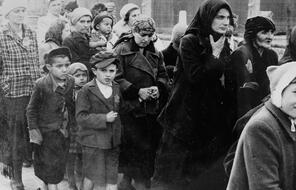Youth and Belonging in the Weimar Republic
At a Glance
Language
English — USSubject
- History
- The Holocaust
- Human & Civil Rights
A previous version of this newly revised reading was titled “What Did You Learn in School Today.”
For many Germans born in the decade before World War I, the years of the Weimar Republic were a disorienting time. These young people were coming of age in a defeated country beset by turmoil, change, and the questioning of traditional values. According to one such person:
We were not spared anything. We knew and felt the worries in the house. The shadow of necessity never left our table and made us silent. We were rudely pushed out of our childhood and not shown the right path. The struggle for life got to us early. Misery, shame, hatred, lies, and civil war imprinted themselves on our souls and made us mature early. 1
But Germany’s schools remained centers of tradition. Most teachers were conservative, both in their way of teaching and in their politics, and many were anti-socialist and antisemitic. A young man known as Klaus describes his schooling in the 1920s:
We were taught history as a series of facts. We had to learn dates, names, places of battles. Periods during which Germany won wars were emphasized. Periods during which Germany lost wars were sloughed over. We heard very little about World War I, except that the Versailles peace treaty was a disgrace, which someday, in some vague way, would be rectified. In my school, one of the best in Berlin, there were three courses in Greek and Roman history, four in medieval history, and not one in government. If we tried to relate ideas we got from literature or history to current events, our teachers changed the subject.
I really don’t believe that anyone was deliberately trying to evade politics. Those teachers really seemed to think that what went on in the Greek and Roman Empires was more important than what was happening on the streets of Berlin and Munich. They considered any attempt to bring up current political questions a distraction . . . because we hadn’t done our homework.
And there was always a great deal of homework in a school like mine, which prepared students for the university. At the end of our senior year, we were expected to take a detailed and exceedingly tough exam called the Abitur. How we did on the exam could determine our whole future. Again, the Abitur concentrated on our knowledge of facts, not on interpretation or on the expression of personal ideas. 2
Some young people, seeking to escape from the boredom of traditional schooling, sought adventure and companionship in hiking clubs, which became popular. Others took advantage of new forms of music, art, and drama in the cities. For others, sports became a national pastime, as journalist Sebastian Haffner describes:
In the years 1924, 1925, and 1926, Germany suddenly blossomed into a great sporting nation. Never before had it been a land of games. Never had it been creative and inventive in sports, like England and America. In fact, the true spirit of sport, the self-effacing, playful absorption in a fantasy world with its own rules and regulations, is altogether foreign to the German mentality. Nevertheless, in those years the membership of sports clubs and the numbers of spectators at sports meetings multiplied tenfold at a stroke. Boxers and sprinters became national heroes, and the twenty-year-olds had their heads full of athletics results, the names of winners, and all those numerical hieroglyphs into which feats of speed and skill are translated by the press.
It was the last German mass mania to which I myself succumbed. For two years my mental life stood still. I trained doggedly as a medium- and long-distance runner and would have sold my soul to the devil without hesitation if I could once have run 800 meters in under two minutes. I went to every athletics meet, and I knew every runner and his best times, not to mention the list of German and world records which I would have been able to reel off in my sleep. The sports news played the same role as the army bulletins ten years before, athletics records and race times replacing the numbers of prisoners and quantity of booty. The headline “Houben Runs Zoo Meters in 10.6” evoked the same feelings as, in its day, “20,000 Russians Taken Prisoner”; and “Peltzer Wins English Championship and Breaks World Record” corresponded to events that the war, alas, had failed to produce: “Paris Falls,” perhaps, or “England Sues for Peace.” Day and night I dreamed of vying with Peltzer and Houben. I missed no sports meet. I trained three times a week, stopped smoking, and performed exercises before going to bed. I felt the utter joy of being in complete harmony with thousands, tens of thousands of people, yes, even with the entire world. There was no one of my age, however alien, uneducated, or unpleasant, with whom I could not at first meeting engage in prolonged, animated conversation—about sports, of course. Everyone had the same figures in their heads. Without the need to say a word, everyone had the same feelings about them. It was almost as grand as the war. It was the same sort of great game again. We all understood one another. Our spiritual nourishment was statistics, our souls perpetually aquiver with excitement: Would Peltzer beat Nurmi, too? Would Kornig do it in 10.3? Would one of our German 400-meter runners finally manage 48? We trained and ran our little races, our thoughts always with our “German champions” at the international athletics meet, just as we had fought our own little battles with small Tesching rifles and wooden swords in the streets and playgrounds during the war, our thoughts with Hindenburg and Ludendorff. What a simple, exciting life! 3
Political parties in the Weimar Republic also competed for young people’s interest and loyalty. Many created youth groups to attract young members to their parties. The Nazi Party established the Hitler Youth in the 1920s in an effort to win over young supporters, and they were especially successful by the end of the decade in attracting university students to another organization, the National Socialist German Students’ League. One young man describes this way why the Nazis appealed to him:
I read Hitler’s speeches, studied the program of the National Socialist party, and gradually I was practically reborn. Filled with a pure joy I realized that what my mother had once said was true after all—that it was a hallowed act to give up one’s life for Germany as the soldiers at the front had done. . . . I became a National Socialist. No voice protested against it; my heart was not full of fear at the thought of National Socialism; there was only a joyous acknowledgement, a bright enthusiasm, a pure faith in Adolf Hitler and Germany. 4
Connection Questions
- What do the excerpts in this reading suggest to you about what it was like to be a young person in the Weimar Republic?
- How would you describe the type of education Klaus received? What was emphasized or omitted? What attitudes and values were transmitted to Klaus at school? How were they transmitted?
- What is the purpose of education in a democracy? What should students learn at school to best support a democratic society?
- What was the attraction of sports for Sebastian Haffner? What needs did they fulfill for him? From his perspective, what role did sports play in Weimar society? What role do they play in your society?
- Why did the Nazis appeal to the last young man quoted in this reading? Where else might young people have turned to fulfill the needs and desires that the Nazis fulfilled for this young man?
- 1Quoted in Peter H. Merkl, Political Violence under the Swastika: 581 Early Nazis (Princeton, NJ: Princeton University Press, 1975), 236.
- 2Ellen Switzer, How Democracy Failed (New York: Atheneum, 1977), 62–63. Reproduced by permission from Curtis Brown, Ltd.
- 3Sebastian Haffner, Defying Hitler: A Memoir (Farrar, Straus & Giroux, 2000), 72–74. Reproduced by permission from Farrar, Straus & Giroux.
- 4Theodore Abel, Why Hitler Came into Power (New York: Prentice-Hall, 1938: reprint, Cambridge: Cambridge University Press, 1986), 212. Reproduced by permission from Simon & Schuster.
How to Cite This Reading
Facing History & Ourselves, "Youth and Belonging in the Weimar Republic," last updated August 2, 2016.








